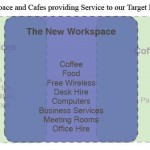I’ve never made secret my love of the concepts of ‘Going Bedouin’ or ‘Co-Working’. The difference between them is simple. Going Bedouin The principle of having your entire business on your back. Today you work in a coffee shop on Royal Avenue, tomorrow a coffee shop in Bradbury Place. And with 3G USB doohickeys being … Continue reading “Workplaces”
I’ve never made secret my love of the concepts of ‘Going Bedouin’ or ‘Co-Working’.
The difference between them is simple.
Going Bedouin
The principle of having your entire business on your back. Today you work in a coffee shop on Royal Avenue, tomorrow a coffee shop in Bradbury Place. And with 3G USB doohickeys being so cheap these days it seems that you don’t even need to find a WiFi-enabled cafe. Going Bedouin is going to be best for someone who has a relatively paper-free business due to the lack of printing facilities and they’d also be likely to stock up on extra batteries just in case their workplace of the day doesn’t have any convenient power points. Your expenses are going to be the amount of food and beverages that the coffee shop owner will expect you to buy in order to retain your seat. Some Bedouin workers have scorned the idea of ‘paying your way’ but it is an important part of the economy. If you don’t like it, shack up in a corner of the bus station or in another public space.
Co-Working
For the most part, this is about hiring a desk in a shared space. This is different to hiring a serviced office and sitting hidden in there knowing that the guy in the next office is working on something different. Shared spaces are all about getting the benefits of being in a busy office with less of the negatives. Candidates for co-working tend to be social people, people not irritated by the presence of others and people who might have worked for a big company before and missed the interaction at the water cooler or the photocopier when they went independent. Most co-workers will only use the shared space part-time due to other pressures in their lives. The Co-Work space should therefore be something of a refuge and it’s not conducive to have stressed-out, under-pressure individuals in your space (unless watching someone slowly implode really relaxes you). Co-Working is about relationships more than anything.
Excellence in workspace
An important point in changing your workstyle to add in Bedouin working or Co-Working is to make sure it provides an improvement.
The space you choose should fit in with the pattern of how you want to work. If you like working early in the morning or late at night, you’ll need to consider this (most half decent cafes in Belfast seem to close at 6). Consider your transport routes and, more importantly, your footwear. Consider that you may need to bring a coat of some sort even when the weather seems fine (and a warm sweater if you’re in Ireland).
For a Co-Working space, look at the other co-workers and make an attempt to be friends with them. Is the space tidy or well-kept? Do they have insurance? Or Alarm systems? What’s to stop someone walking in off the street? Do you feel comfortable leaving your equipment and content unattended? Do they have a lockup for your stuff when you’re out of the office? What ‘virtual office’ facilities do they have? Fax? Telephone? Receptionist? Do they have a kitchen? What about a breakout area for chat? Do the other co-workers have any odious habits? Does it smell fresh? Are the windows open? Is the carpet clean?
And when it’s restroom time – do you pack up your mobile office into your bag and disappear into the restroom to emerge later smelling faintly of cheap liquid soap? Do you leave it all out and hope that someone will look after your stuff?
Co-Working is all about relationships – do you trust these people?
Prerequisites
The first and most important element in considering Bedouin or CoWorking plans is whether or not you can make money – some businesses lend themselves naturally, while some do not. Services like Twitter give you a skewed perspective of work because there’s little visibility of time zones, business models and segregation. While you’re making your decisions, you can see that some people are re-installing their gaming machines or going for a walk, sitting in a coffee house drinking Americanos, giving talks or drumming in the park. You don’t see the work that they do because you’re always being updated by someone.
Another element that people don’t consider is outsourcing work that doesn’t bring direct value. Hire an accountant. Make sure your mail host and file server host are reliable. Make sure you have a reliable communications network with others in your team (if you are part of a team) because your team will need that interaction with you.
Ask yourself why you want to change your workstyle. Coffee is cheaper at home. Peace and quiet probably more achievable (unless there are kids involved). Talk through it with your partner at home as they may resent you changing from being a teleworker-at-home to a teleworker-in-cafe.
If you’re doing it, embrace it. Make the most of it and don’t be a wallflower.
Next Steps
I plan to talk more about possibilities in Co-Working over the next few days. I don’t know how much of my vision concurs with the vision of the individuals who make up the Co-Working Belfast group because I have some very specific ideas of what I want to see. I still have this business plan for ‘the new workspace’ which I wrote in 2006 and I think it deserves another crack of the whip.




